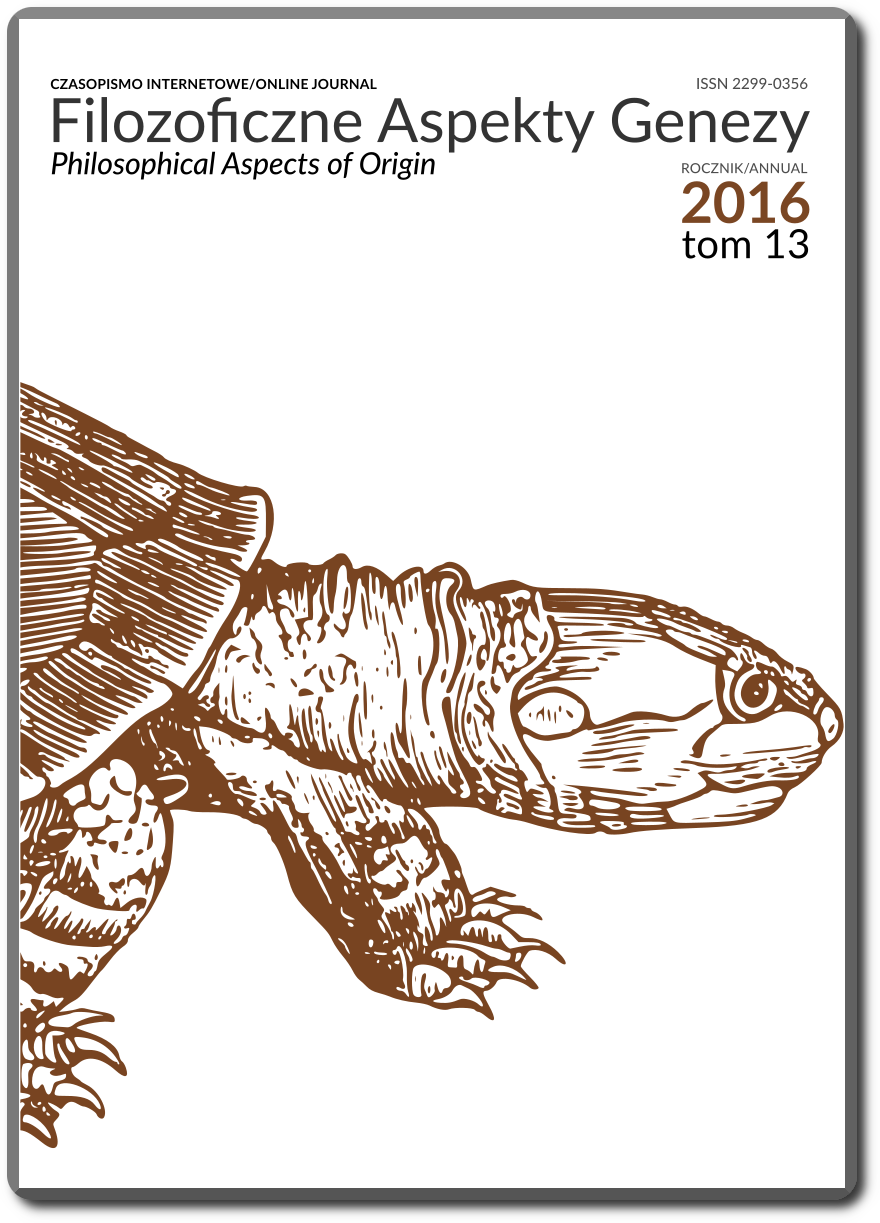Opublikowane 24.05.2021
Słowa kluczowe
- naturalizm metodologiczny,
- dualizm metodologiczny,
- austriacka ekonomia,
- ludzka komputacja,
- sztuczna sztuczna inteligencja
- filozofia moralna,
- biologia systemowa,
- zasady inżynieryjne,
- inżynieria odwrotna ...More

Utwór dostępny jest na licencji Creative Commons Uznanie autorstwa 4.0 Międzynarodowe.
Jak cytować
Bartlett Jonathan, Holloway Eric, Nienaturalistyczne metodologie we współczesnej praktyce, Filozoficzne Aspekty Genezy 2021, vol. 13 pp. 101-117, https://doi.org/10.53763/fag.2016.13.127
Abstrakt
W niektórych dziedzinach istnieją już alternatywy dla naturalizmu metodologicznego. Jednakże niewiele osób spoza danej dziedziny zna te alternatywy lub wie, jak są wykorzystywane. Niekiedy nawet sami przedstawiciele tych dziedzin stosują te nienaturalistyczne metodologie, nie wiedząc, że nie są one spójne z naturalizmem metodologicznym. W artykule dokonujemy krótkiego przeglądu dziedzin, w których — zgodnie z naszą wiedzą — występują metodologie niezależne od naturalizmu.
Downloads
Download data is not yet available.
Bibliografia
- „Artificial Artificial Intelligence”, The Economist 8 January 2006, http://www.economist.com/node/7001738 (13.04.2017).
- Bagus Phillip, „Methodological Naturalism in the Austrian School of Economics”, 2016 Conference on Alternatives to Methodological Naturalism 2016.
- Bartlett Jonathan, „Measuring Software Complexity Using the Halting Problem”, w: Bartlett, Halsmer, and Hall (eds.), Engineering and the Ultimate…, s. 123-130.
- Bartlett Jonathan, „Using Turing Oracles in Cognitive Models of Problem-Solving”, w: Bartlett, Halsmer, and Hall (eds.), Engineering and the Ultimate…, s. 99-122.
- Bartlett Jonathan, Halsmer Dominic, and Hall Mark (eds.), Engineering and the Ultimate: An Interdisciplinary Investigation of Order and Design in Nature and Craft, Blyth Institute Press, Broken Arrow, Oklahoma 2014.
- Bolt Kristen Millares, „Amazon Creates Artificial Artificial Intelligence”, Seattle Pi 3 November 2005. http://www.seattlepi.com/business/article/Amazon-creates-artificialartificial-intelligence-1186698.php (13.04.2017).
- Dai Peng, Mausam, and Weld Daniel S., „Artificial Intelligence for Artificial Artificial Intelligence”, Proceedings of the Twenty-Fifth AAAI Conference on Artificial Intelligence 2011, https://www.aaai.org/ocs/index.php/AAAI/AAAI11/paper/viewFile/3775/4051 (13.04.2017).
- Gilder George, Knowledge and Power: The Information Theory of Capitalism and How It Is Revolutionizing our World, Regnery Publishing, Washington, DC. 2013.
- Halsmer Dominic, Gewecke Michael, Gewecke Rachelle, Roman Nate, Todd Tyler, and Fitzgerald Jessica, „Reversible Universe: Implications of Affordance-Based Reverse Engineering of Complex Natural Systems”, w: Bartlett, Halsmer, and Hall (eds.), Engineering and the Ultimate…, s. 11-38.
- Khatib Firas, Dimaio Frank, Cooper Seth, Kaźmierczyk Maciej, Gilski Mirosław, Krzywda Szymon, Zabrańska Helena, Pichova Iva, Thompson James, Popović Zoran, Jaskólski Mariusz, and Baker David, „Crystal Structure of a Monomeric Retroviral Protease Solved by Protein Folding Game Players”, Nature Structural & Molecular Biology 2011, vol. 18, no.10, s. 1175-1177.
- Law Edith and Von Ahn Luis, Human Computation, Morgan and Claypool 2011.
- Marcus Adam and Parameswaran Aditya, „Crowdsourced Data Management: Industry and Academic Perspectives”, Foundations and Trends in Databases 2015, vol. 6, no. 1-2, s. 1-161.
- Menger Carl, Investigations into the Method of the Social Sciences with Special Reference to Economics, trans. Francis J. Nock, New York University Press, New York and London (1883) 1985.
- Nelson Paul, „Design Triangulation”, 2016 Conference on Alternatives to Methodological Naturalism 2016, film: https://www.youtube.com/watch?v=rNY_i1kJAnk (13.04.2017).
- Robertson Douglas S., „Algorithmic Information Theory, Free Will, and the Turing Test”, Complexity 1999, vol. 4, no. 3, s. 17-34.
- Savitch Walter J., Pascal: An Introduction to the Art and Science of Programming, Benjamin-Cummings Publishing Company, San Francisco 1984.
- Senor Dan and Singer Saul, Start-up Nation: The Story of Israel’s Economic Miracle, Twelve, New York 2011.
- Thiel Peter and Masters Blake, Zero to One: Notes on Startups, or How to Build the Future, Crown Business, New York 2014.
- Von Mises Ludwig, Ludzkie działanie. Traktat o ekonomii, przeł. Witold Falkowski, Biblioteka Klasyków Ekonomii, Instytut Ludwiga von Misesa, Warszawa 2007.
- Woese Carl R., „A New Biology for a New Century”, Microbiology and Molecular Biology Reviews 2004, vol. 68, no. 2, s. 173-186.



